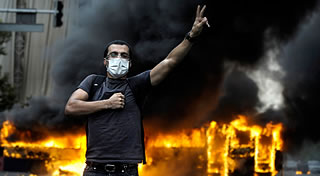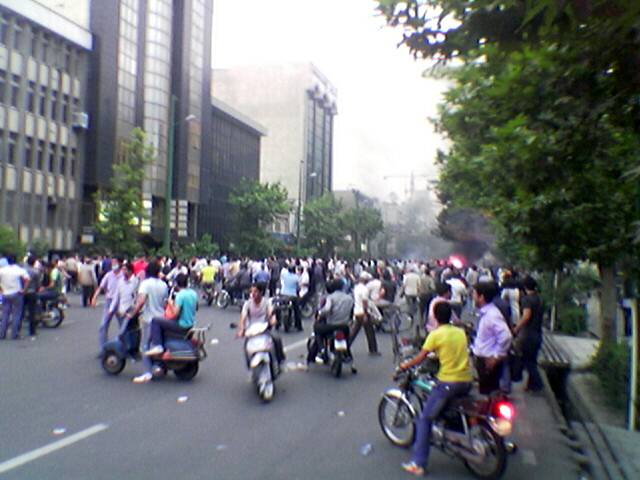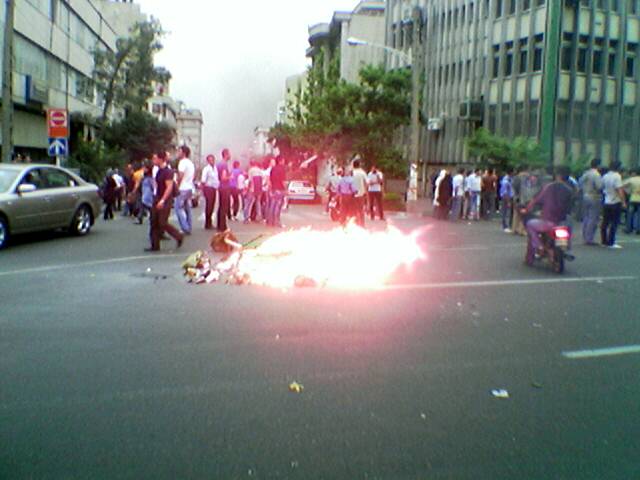
My first engagement with Iranian politics happened in 1997 in Tehran when the former Iranian president, Mohammad Khatami, was running for president. Khatami ran on the platform of change, reform and support for "dialogue among civilizations"-- a notion deeply unfamiliar to a post-revolution born teenager who had thought the only interaction Iranian leaders were interested in having with Western countries was to wish "death" on them. The election was so exciting that it brought my parents to the polls for the first time since the 1979 Revolution.
But that level of excitement in the 1997 elections was incomparable with what is going on in Iran today. Throughout the past four years, Ahmadinejad has rolled back all the Khatami period liberties; Although Iranian theocrats have been making anti-Israel statements since the revolution as a propaganda tool, Ahmadinejad's ratcheting up of that rhetoric has led to more isolation of the country and scrutiny of its fifty year old nuclear program. His deeply religious beliefs have alienated the youth in Iran, the majority of whom are strongly secular. And he has cracked down on civil society, human rights activists, bloggers and journalists in the name of national security.
All of these actions have made Iran into a room filled with gas and no escape valve. The current political momentum due to the intense competition between the incumbent, Ahmadinejad, and challenger, Mir Hossein Mousavi -- a politician and the last Iranian Prime Minister before the post was eliminated in 1989 -- is acting as that much needed escape, leading to one of the most historical scenes ever seen in Iran.
Mousavi has been running on the platform to institutionalize social justice and expand freedom of expression. His platform has energized millions of young Iranians and brought them to the streets to engage in one of the most sustained campaigns of political expression since the Iranian revolution. Women and men have been dancing to banned pop music, waving images of Mousavi and chanting catchy slogans like "Ahmadi bye bye! Ahmadi bye bye!" Business owners have been selling juices and water to the crowds while little ten year old girls have been handing out pro Mousavi flyers. Supporters of Mousavi have been wearing green shirts, scarves and headbands, in a form of solidarity with their candidate who has been making his own appearances with a silk green scarf.
This is not to imply that Ahmadinejad has little popular support. The religious factions, volunteer religious code enforcers (Basij) and a large segment of the poor in Iranian society that have become dependent on government handouts make up a vibrant base for Ahmadinejad. But this level of support is not comparable with that of millions of Iranian youth, activists, journalists, labor union members, women and minorities who have been backing Mousavi. Absent any major irregularities or widespread rigging, it is very hard to see how Ahmadinejad could stand any chance of winning on Friday.
But what's important to note is the significance of this movement. Most of the Iranians who are in the streets don't see this election as a simple political competition between an incumbent and a reformer; they are rebelling against the fundamental theocratic structure of the Iranian political system, and the main pillars of Islamic Republic itself. People have been using the election as a cover to take to the streets their deepest dissatisfactions with every aspect of life in Iran -- from the lack of the freedom expression during non-election season and poor economic conditions to the flawed political structure of the Islamic Republic that places all the major powers of the state in the hands of an unelected Ayatollah. Most Iranians who are so enthusiastic about Mousavi will tell you that they, by no means, believe he is the best Iran can do; they believe there should be no Guardian Council of clerics who decide who can or can't run for office based on their loyalty to Islamic values to begin with.
So why, then, are Iranians so enthusiastic about Mousavi who -- while a reformer -- very much supports the structure of the Iranian regime and role of Supreme Leader? The reason is that over the past thirty years, the Iranian youth have learned not to let the perfect become the enemy of the good. They understand that no candidate who can get qualified by the Guardian Council will ever meet their idealistic requirements, which include, among other things, the elimination of the Council and all other elements in the Iranian system that systematically eliminates or dilutes the purity of its democracy. But some look at Mousavi as they did Khatami: as Iran's Gorbachev. They believe that just as Gorbachev weakened the Soviet system from within through Glasnost and Perestroika, which eventually led to Yeltsin's rise and collapse of the Soviet Union (which even Gorbachev didn't intend), Mousavi can lead to the opening of Iranian system and allow for the kind of social, political, economic and international progress that goes far beyond anything he is actually promising.
Why should Americans care? What happens in Iran will have a direct impact on Iranian-American relations and geopolitics in the entire region. Unlike Ahmadinejad, Mousavi is much less likely to financially support Hezbollah and HAMAS. While Mousavi is not going to dismantle the Iranian nuclear program, he seems uninterested in maintaining the ongoing feud between Iran and the international community on the issue and will likely be more open to transparency for its activities and making the case that the program has peaceful purposes. Neither is he interested in denying historical facts like the Holocaust, which has made Netanyahu and Israel's radicals even more paranoid than they normally are.
But perhaps most importantly, if Mousavi is elected, the United States is going to have a much easier time initiating dialogue with Iran. Unlike Ahmadinejad, Mousavi's political engine doesn't run on blind nationalism, fear mongering and hostility with the outside world. Mousavi's base consists of progressives that want normal relations with the United States and the international community, and his message goes hand in hand with President Obama's message of "mutual understanding and mutual respect."
It is too early to tell which politician is going to win in Iran. But what is already clear is that the Iranian people have already won, for through their lively defiance of normal limits on freedom of expression and intelligent usages of civil resistance tactics, they have shown the international community that figures like Ahmadinejad and Khamenei are not their legitimate representatives. Regardless of the election results, this progressive freight train is not going to be stopped now.
Selected Incoming Evidence on Fraud in the Iranian Election:
And the group's Facebook page: Ahmadinejad Is Not My President.
Sat, June 13, 6:51pm, EST: New Picture from Gooya: 
Sat, June 13, 6:19pm, EST: Protesters just captured a police station in Tajrish, Tehran, and one in Tabriz, Mousavi's home city. The state run communications company in Amir Abad has been set on fire.
Sat, June 13, 6:06pm, EST: New pictures from Iran:

-Sat, June 13, 5:55pm EST: Iran has detained political figures from a number of different movements and parties. In addition, journalist Hanif Mazrouei--journalist and political activist in Tehran--confirmed the arrest of the following individuals: Mohsen Mir Damadi (Head of Jebheye Mosharekat (coordination front)) and his wife, Sa'id Shari'ati, Abdollah Ramezan Zadeh and Zahra Agha Jari from the political office of Jebheye Mosharekat.
-Sat, June 13, 5:20pm EST: Iran just cut out Facebook, Twitter, YouTube, cell phone service and text messaging throughout Iran.
-Sat, June 13, 4:30pm EST: According to Farsi Gooya News, Mir Hossein Mousavi has been placed under house arrest. Furthermore, security forces have attacked students at Tehran University, according to reports coming from Tehran streets (Abbas Abad, Sa'adat Abad, Tajrish and Zafaranieh).
-A statement by Interior Ministry staffers said the results weren't honest. The statement reads: ""As dedicated employees of the Interior Ministry, with experience in management and supervision of several elections such as the elections of Khamenei, Rafsanjani and Khatami, we announce that we fear the 10th presidential elections were not healthy." http://andrewsullivan.theatlantic.com/the_daily_dish/2009/06/a-crack-within-the-ministry-of-the-interior.html -The New York Times is also reporting that "One man who worked in the Ministry of Interior, which carried out the vote count, said the government had been preparing its fraud for weeks, purging anyone of doubtful loyalty and importing pliable staff members from around the country. 'They didn't rig the vote,' claimed this man, who showed his ministry identification card but pleaded not to be named. 'They didn't even look at the vote. They just wrote the name and put the number in front of it.'"http://www.nytimes.com/2009/06/14/world/middleeast/14memo.html?_r=2
-From NBC News, on how the violence started: What started off as a small rally outside a pro-reformist newspaper swelled into a massive crowd of people chanting, "Death to the dictator, death to Ahmadinejad!" Then, what started with a small amount of police pushing the crowd back turned into huge riot police in armored gear and motor bikes beating all the young students here with batons, knocking them back. The students responded by throwing stones, which the police then threw back. Now the police are coming off all the heart streets and main streets to try and disperse the crowd. -The Interior Ministry in Iran says that Ahmadinejad won Tabriz in the state of Azarbaijan with 57% of the vote. But Tabriz is Mousavi's hometown, and based on comparing Ahmadinejad's And Mousavi's rallies and popular opinion surveys in Tabriz, Mousavi was expected to win the overwhelming majority in Tabriz.
-Ahmadinejad's claim to have won over 50% of Tehran is also highly suspect and not consistent with the strong pro Mousavi pre-election trends.
-The Interior Ministry reports that Mehdi Karoubi, another moderate candidate won a meager small 320,000 votes. Dr. Sazegara--founder of the Iranian Revolutionary Guard and now a political dissident who resides in the United States--said on the Farsi Voice of America that this number is fictional and "even if all of his extended family members voted for him, his numbers would be higher than that." He also said that he believed these numbers were pre-fixed.
-Mohsen Rezaei, the conservative and fourth candidate to be running in this election won 670,000 (nearly twice as many votes as Karoubi), although he was polling significantly more poorly than Karoubi before the election.
The Electoral Commission did not wait three days before certifying the results of the election, and the speed at which they declared the results is inconsistent with the amount of time the manual counting of the votes was expected to take. And how did Ahmadinejad know that he won the election "by a wide margin" before the Interior Ministry had even released the results?
UPDATES FROM ELECTION DAY (FRIDAY):
-Iran has cut SMS service on all cell phones on Election Day.
-Voting hours have been extended throughout Iran due to heavy turn out.
-Daniel Pipes--an American neoconservative--said during a panel discussion at the Heritage Foundation that he would vote for Ahmadinejad if he could, because he prefers "an enemy who is forthright, blatant, obvious".
Iran: More Than An Election; A Green Revolution!